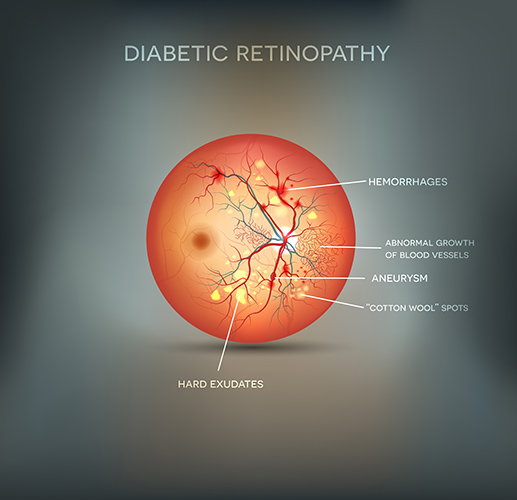
Diabetic Retinopathy is a complication from diabetes that affects the eyes. There are approximately 200,000 cases of Diabetic Retinopathy diagnosed per year. Proper treatment and diagnosis can improve quality of life by maintaining or possibly restoring the eyes function. There are ways to reduce the risk of developing this condition and helpful treatment options for those who have developed it already. Although, Diabetic Retinopathy does not have a cure yet, treatment options such as those offered by Eye Michigan ophthalmologists can manage your symptoms. With Eye Michigan support and guidance, best case scenarios are possible to achieve. It is helpful to know the facts.
Did you know that Diabetic Retinopathy affects both individuals with Type 1 and Type 2 diabetes? Type 1 diabetes begins in youth (juvenile onset) and is insulin-dependent. This means that a healthy diet and lifestyle changes may help (as it does in managing any illness), but not nearly as much as it aids those with Type 2 diabetes. Type 2 diabetes is more typically found to develop in adulthood. It is currently rising in prevalence in younger and younger ages due largely to poor lifestyle habits such as a lack of exercise, obesity, high sugar intake, and additives in processed foods. The body no longer is able to use insulin properly. For the eyes, what can result, is high blood sugar levels that damage the network of tiny vessels that supply blood to the retina.
How to Reduce Your Risk
There is a high percentage of Type 1 patients who develop Diabetic Retinopathy, and a smaller, yet still significant, percentage of Type 2 patients who will also develop it if no preventative action is taken. Controlling blood sugar levels in both Type 1 and Type 2 patients’ is very important to reduce risk. If insulin levels are more stable, inflammation decreases, and therefore the blood vessels of the eyes are also less affected. Be sure to talk to your doctor to learn more about dietary choices that will keep your body as healthy as possible. With inflammation and blood sugar levels under control, you dramatically improve your odds of avoiding the diabetic complication of this disease.
Treatment
There is a wide range of treatment options available to help you manage Diabetic Retinopathy. Treatments such as laser photocoagulation, modified grid laser photocoagulation, panretinal photocoagulation, intravitreal triamcinolone acetonide, intravitreal anti-VEGF drugs, vitrectomy, and light treatment. Aspirin use is even sometimes helpful. Eye Michigan ophthalmologist will recommend the best treatment plan to work for you.
Contact us to learn more.
